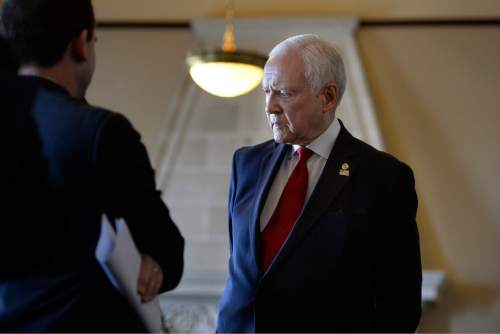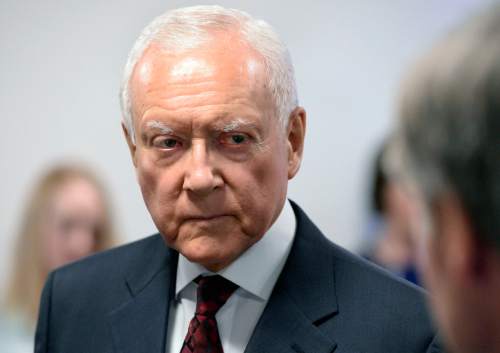This is an archived article that was published on sltrib.com in 2016, and information in the article may be outdated. It is provided only for personal research purposes and may not be reprinted.
Washington • When President Barack Obama delivered the State of the Union address Tuesday, Utah's Sen. Orrin Hatch was far, far away.
It was on purpose and by assignment.
For Obama's last annual address to Congress, the Utah Republican was a "designated survivor," a position set up in the post-Sept. 11, 2001, era as a safeguard to ensure continuity of government when leaders of America's three branches gather in one place.
Hatch is the Senate president pro tempore, a constitutional position that places him third in line for the presidency.
If the unthinkable were to happen at the Capitol gathering, Hatch would become president, given that Obama, Vice President Joe Biden and House Speaker Paul Ryan all were in attendance in the House chamber.
The Executive Branch usually picks one Cabinet member in the presidential line of succession to stay away from the Capitol during the State of the Union, a protective move that dates back to the Cold War when worries of a nuclear attack were high. Homeland Security Secretary Jeh Johnson had the away assignment Tuesday.
After 9/11, Congress started choosing a few senators and representatives to stay home as well — or to remain in a different, undisclosed location, in case a terrorist attack wiped out the Capitol. Most members of Congress, Cabinet secretaries, Supreme Court justices and top White House aides attend the State of the Union.
Michael Stokke, who was deputy chief of staff to then-House Speaker Dennis Hastert, R-Ill., says that after Sept. 11, congressional leaders began focusing more on the continuity of government.
"You start thinking about all the contingency you need in place," Stokke said. "One of the things we came up with, because the State of the Union was so close after 9-11, is maybe we better have some people take a pass on this one and keep a few people out of the Capitol."
For several years, that actually meant sending a few members far outside Washington, D.C. It's unclear now if that's the case.
Hatch's office declined to say where the senator was during Tuesday's speech but he might have just stayed at home in a Virginia suburb.
"Hatch is a perfect guy because who better to know the history of the place," Stokke said of the choice. "That's what you think about when you try to think about who sits out, is someone who could really help the country come back together."
Hatch is the most senior Republican in the Senate, a position that landed him the Senate president pro tempore job.





